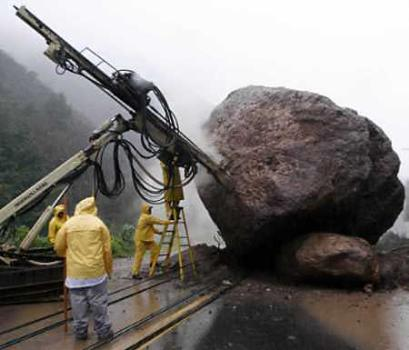| Environmental Geology | ||||||||||||||||||||
|
Notes
|
Required textbook: Environmental Geology 7th / 6th Ed. Carla W. Montgomery, 2006 Course Description: Environmental Geology is a broad topic encompassing both the effect of humankind on Earth and the effect of significant geologic processes on life on Earth. Environmental Geology focuses on the
interaction of humans and the geological environment. It studies earth processes and their effects on rocks,
soil, fluids, and life in ways that either affect or control the environment. This course is an interdisciplinary
approach to environmental geosciences. Fundamental geologic concepts such as plate tectonics, geologic
time and surficial processes are used as a basis for understanding a variety of natural processes. The class
elaborates on many of the topics of physical geology including natural and man-induced geologic hazards:
earthquakes, volcanoes, landslides, and land subsidence; environmental issues, disposal and management of
solid, chemical, and radioactive waste, acid mine drainage as well as the environmental impact of mineral
extraction and water resource utilization.
Objectives: To describe the finite capacity of Earth's resources. To inform students of the enormous and increasingly severe problems related to overpopulation, excessive consumption of resources, poor land use,
and pollution of air and water. How do geologic processes and events directly influence human societies?
How have humans changed the earth? Real-world examples include soil and groundwater contamination,
mineral and energy resource development, and threats to the earth's biodiversity. Also, the course takes a
closer look at the geologic record of global change and the debate over global warming.
Grading: This course contains a midterm exam of 100 points and a final exam worth 200 points. The exams may contain such questions as short answer, multiple choice, and true and false. Make-up exam will only be allowed in case of injury or illness. There will be 2 pop quizzes and a final class presentation carrying a total of 100 points. A 400-350 B 349-300 C 299-250 D 249-200 F 199-0 ATTENDANCE POLICY: Attendance to all classes is highly recommended. Class attendance is essential to success in this course. Focus on understanding concepts rather than memorizing the facts and numbers. Use the online resources, quizzes and other materials provided by the textbook manufacturer: http://www.mhhe.com/montgomery7 . If you do miss a class, it is your responsibility to cover the material, find out about class announcements, etc. Material that is covered in lecture is not always readily obtained by just reading the text. Because of the nature of the course, excessive absences may result in a lower grade. ATTENDANCE IS REQUIRED FOR ALL TESTS! Preparing make-up material for tests is very time consuming for the instructor. Make-up will be allowed for valid excuses, such as severe illness, death in the family, or excused university sponsored events. The student must make arrangements with the instructor before missing or immediately upon returning to class to arrange for a make-up exam, otherwise the grade for the missed exam will be recorded as zero. Course contents*
|
|||||||||||||||||||
